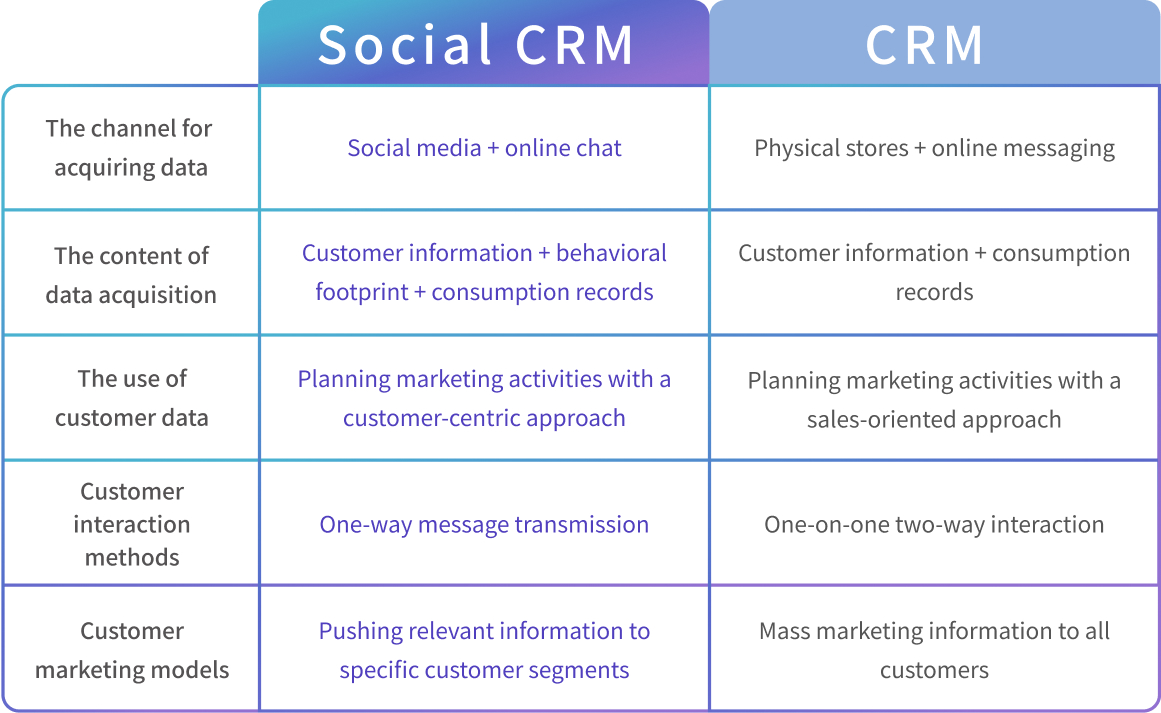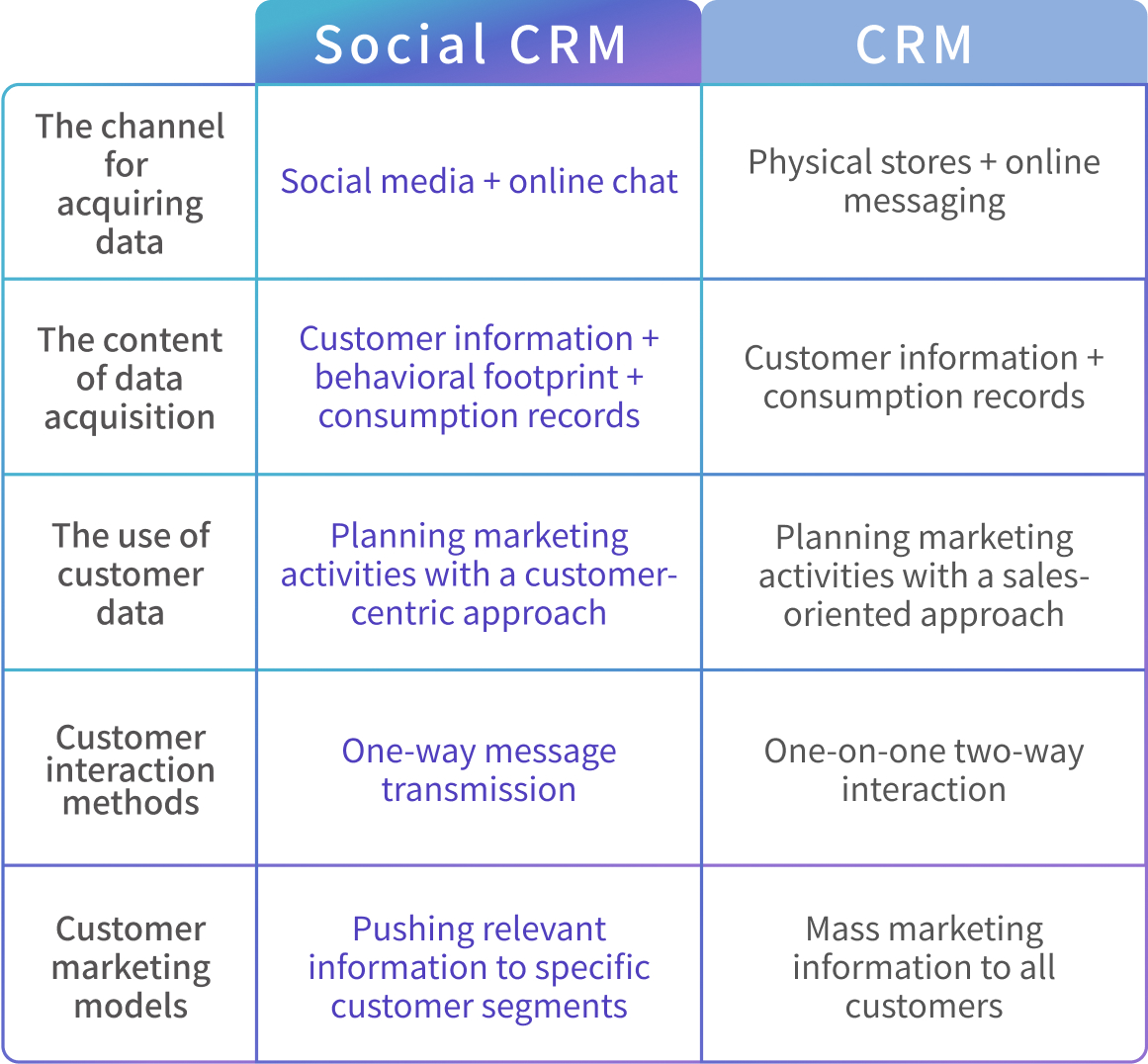.jpg)
.jpg)
With the iterative development of social media in today's landscape, many brands are integrating with CRM systems to generate more revenue. The channels of communication between brands and customers are no longer limited to phone calls, texts, or emails. Now, through "Social CRM platforms," social media serves as a medium to bridge the gap between them in more diverse ways. This approach allows for a deeper understanding of the needs and preferences of the primary customer base, facilitating the creation of more personalized marketing and services. Consequently, it achieves three main marketing objectives: attracting, nurturing, and retaining customers, effectively enhancing customer loyalty to the brand and effortlessly managing customer relationships.
Next, we'll explore what SCRM is, how it differs from conventional CRM, and the operational advantages Social CRM can bring to brands, helping you grasp the key points of customer management!
Social CRM, short for "Social Customer Relationship Management,"
integrates social media with CRM systems. Its bidirectional nature allows customers to directly connect with brands, making social media the optimal channel for brand-to-customer communication. This facilitates real-time interaction and the sharing of valuable content, thereby enhancing brand affinity.
By leveraging social media, brands can strengthen relationships with customers, while also gathering their needs and feedback, understanding their purchasing journey and user experience. This leads to better customer understanding, establishing trust, and significantly increasing customer loyalty and repeat purchases.
Social CRM systems can track and integrate consumer actions and basic personal information across social media platforms like Facebook, Instagram, WhatsApp, and Line. This enables the creation of more complete and dimensional customer profiles, allowing brands to achieve personalized marketing and accumulate loyal customers effortlessly through data utilization.
Maochang's SCRM platform encompasses comprehensive marketing functionalities mentioned above, assisting brands with the most professional tools to seamlessly integrate customer data and meet personalized management needs. It enables precise marketing while effectively managing various tasks within the enterprise.
Both Social CRM and traditional CRM are important tools for maintaining customer relationships, but they differ in how they interact with customers.
Traditional CRM primarily relies on customer purchase records, emails, SMS, phone calls, or face-to-face interactions to establish and maintain contact with customers, resulting in a relatively narrow means of obtaining customer information. On the other hand, Social CRM is based on social media platforms, allowing for deeper insights into customer needs and comprehensive observation of customer behavior through online interactions.
With the rise of social media, customers now prefer to interact with businesses on social platforms, giving Social CRM a greater advantage in interacting with and understanding customer behavior. Moreover, the customer data collected through Social CRM can be reused for customer analysis and segmentation, not only improving overall data utilization efficiency but also enabling precise marketing to increase conversion rates.


Differences between SCRM and CRM are characterized by several key features:
1. Channels for acquiring customer data
CRM - Typically relies on consumption and contact data to understand customers. Even if customer social media data is available, it may not be systematically identifiable as belonging to the same individual.
Social CRM - Integrates customer interaction data from social media platforms, as well as relevant activity records, allowing for targeted push notifications based on customer preferences and needs, thereby increasing customer willingness to consume.
2. Content of acquired customer data
CRM - Usually acquires customer consumption amounts and content through consumption behavior or uses one-way message delivery to understand customer needs.
Social CRM - Besides tracking customer activity on social media, it can identify customer identities, collect customer data, and even receive real-time feedback on their evaluations of products or services, gaining deeper insights into customer preferences and behavioral habits.
3. Utilization of customer data management
CRM - Relies on existing customer data to analyze customer needs, preferences, consumption behavior, or survey results, plan future sales models and marketing activities, thus enhancing the efficiency of the sales funnel. CRM focuses on data management and sales processes, primarily sales-oriented.
SCRM - Not only analyzes existing customer data but also consolidates and analyzes customer data collected from other social media or websites, identifies potential consumers, and thereby increases conversion and retention rates. SCRM focuses on maintaining relationships with both new and existing customers and is primarily customer-oriented.
4. Customer interaction modes
CRM - Customer interactions with businesses are typically one-way through communication tools such as SMS, email, or customer service systems, or through direct communication in offline stores, which may not guarantee complete communication in one go. Such one-way message delivery is less efficient, and back-and-forth communication can be time-consuming.
Social CRM - Customers can engage in real-time conversations with businesses through social media, gaining further understanding and integration of customer preferences and needs. When customers provide feedback or questions on social media, businesses can respond immediately, bridging the gap between them and the customer.
5. Customer marketing models
CRM - Obtained customer information and acquisition methods are relatively singular. If companies want to further market through this information, it may lead to every audience receiving the same promotion and activity information, making it difficult to target different audience groups accurately.
Social CRM - Allows companies to understand customer preferences and lifestyle habits, and through segmented management, tailor activity information for specific customer groups, which can generate more interest and achieve precise personalized marketing.
Traditional CRM's one-way interaction mode is outdated and inefficient, unable to explore customer thoughts and needs, and tracking message openings and subsequent effects is challenging. Customers receive standardized content sent by the brand, without the ability to hear customer feedback or respond promptly.
Therefore, Social CRM can be considered an advanced version of CRM. By integrating social media, it not only tracks customer behavior but also enables direct one-on-one interaction with customers, instantly understanding their needs and sentiments. In the past, customer activity records on social media could not be tracked or quantified, but the advent of SCRM has solved these issues perfectly, while also automatically integrating segmented labels, making marketing more precise and effective.
The primary challenge businesses face when implementing Social CRM is managing messages from different channels, particularly providing consistent customer experiences across various communication channels.
As Social CRM is still a nascent field, Maochang has successfully developed an integrated solution that includes four major instant social media platforms (LINE, Messenger, Instagram, WhatsApp), providing comprehensive customer service CRM and marketing management solutions, offering businesses a consistent customer experience.
1. SCRM advantages:Complete Customer Profiles
Traditional CRM systems often only provide records of customer consumption amounts and content, limiting the information available to businesses and hindering the creation of personalized marketing experiences for each customer. Social CRM systems can gather and integrate customer activity history, consumption records, interactions, service feedback, etc., across various social media platforms. This consolidated customer data can then be used to create more comprehensive customer profiles and conduct profile analyses, serving as an ideal basis for formulating marketing strategies.
2. SCRM advantages:Diverse Interaction Modes
Social CRM typically incorporates various interactive features such as carousel-style cards, graphic menus, video messages, etc., providing more engaging and understandable interaction methods. Through proactive message push notifications, Social CRM can offer more comprehensive services. Some Social CRM platforms even establish independent membership systems, enabling brands to attract customers to interact with the brand through point rewards, coupons, etc., and thereby obtain customer data and insights into customer needs. Furthermore, besides marketing push interactions, when customers raise questions or provide feedback on social media, businesses can respond promptly, facilitating two-way interaction and strengthening the relationship with customers.
3. SCRM advantages:More Precise Customer Marketing
Social CRM collects customer data from various customer groups and utilizes automatic tagging to segment management, helping businesses understand each customer, clarify the characteristics of the primary customer groups, and tailor marketing information specifically for each group. By delivering the right message to the right customer, Social CRM creates personalized marketing experiences for every customer.
4. SCRM advantages:24/7 Brand Customer Service Assistant
Social CRM features chatbot functionality, providing complete services to customers on social media platforms 24/7 and collecting any feedback and inquiries, achieving multi-channel two-way communication. These interaction records can also be stored in Social CRM, allowing customer service representatives with assigned permissions to view message logs, ensuring timely response to customer needs.
Social CRM provides businesses with more opportunities to interact with customers, fostering closer connections and trust between brands and customers. Instant and personalized interaction methods effectively enhance customer satisfaction and loyalty, helping businesses establish a positive image, excel in word-of-mouth marketing, and generate long-term commercial benefits.
When businesses have a deeper understanding of customers and can provide personalized services, customers feel valued, leading to increased trust and identification with the brand. Compared to mass one-way advertising information, personalized services are more likely to earn customer trust and encourage them to establish long-term relationships with the brand.